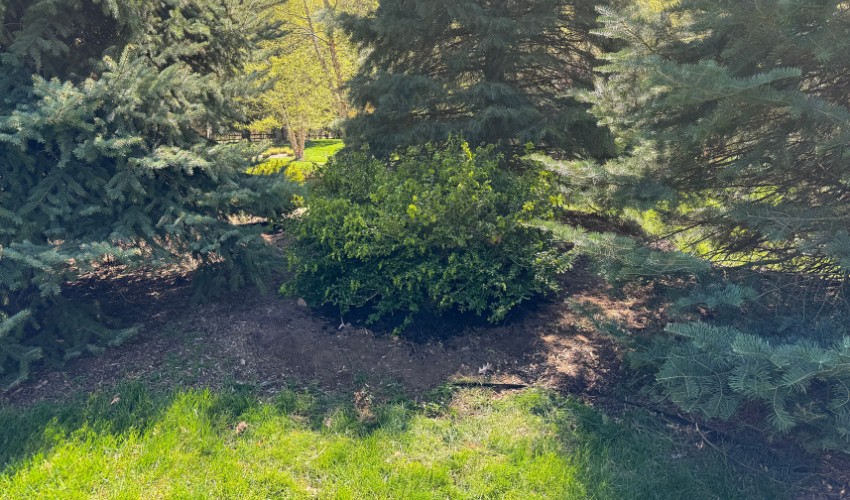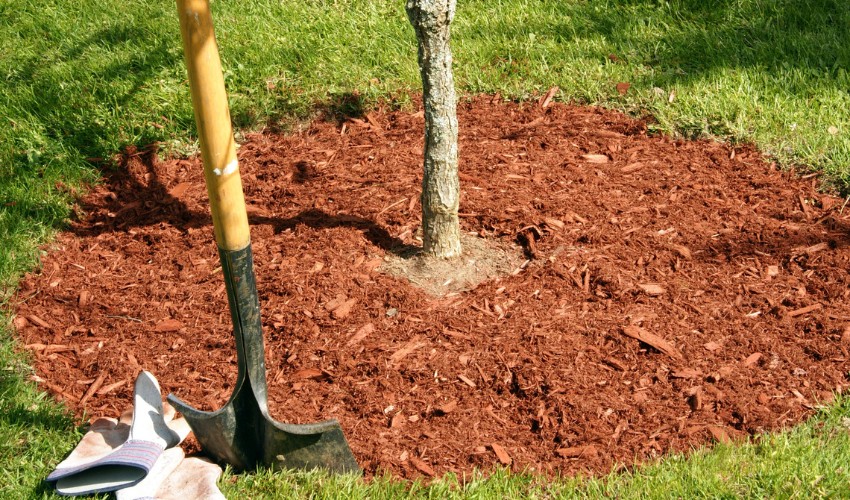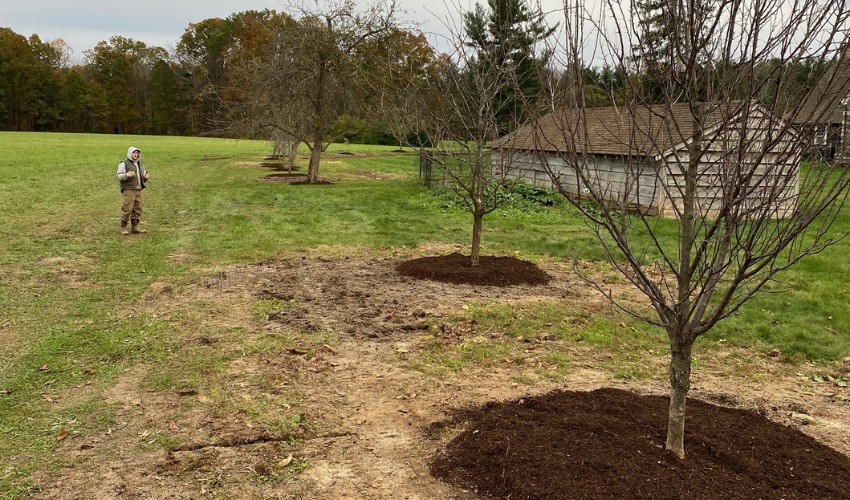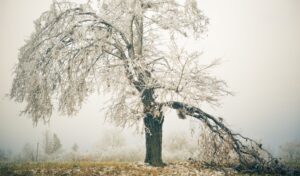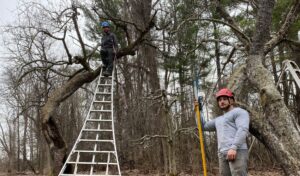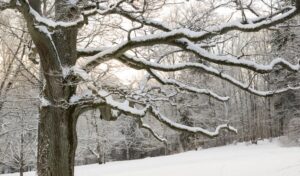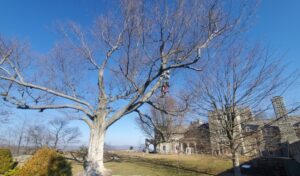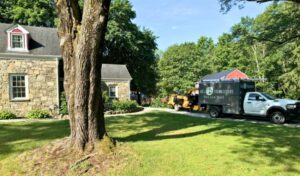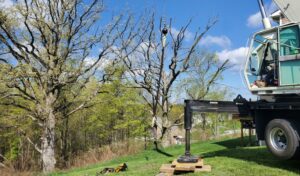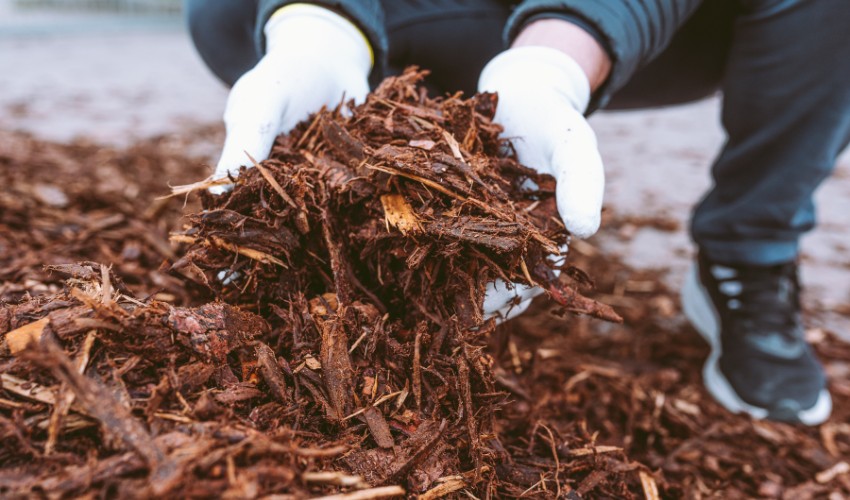
If you’ve ever driven through a tree-lined street in the Hudson Valley, you’ve seen those neat organic mulch rings around every tree. They look tidy, but there’s more to them than appearance. When done right, mulching is one of the easiest and most effective ways to protect your trees. And if you’re using rubber mulch, rock mulch, or skipping it altogether, you could be missing out on some serious benefits!
Key Takeaways:
- Organic mulch suppresses weed growth by limiting sunlight to the soil while making any remaining weeds easier to pull.
- Mulch helps retain soil moisture during droughts, which have become more common in the Hudson Valley in recent years.
- A layer of mulch reduces soil erosion from rainfall, prevents extreme temperature fluctuations, and decreases soil compaction.
- Organic wood chip mulch naturally decomposes over time, adding essential nutrients back to the soil, similar to how a forest floor ecosystem functions.
- Use mulch in conjunction with other tree services like pruning to keep your trees healthy.
7 Benefits of Organic Mulch in the Hudson Valley
Organic mulch does a lot more than people give it credit for. From cutting down on weeds to protecting your soil and tree roots, here are seven ways it can make a real difference in your landscape.
1. Limit the Number of Weeds That Grow
Weeds aren’t just annoying to look at, they also steal water and nutrients your trees need. Some people use chemicals or plastic to keep them down, but organic mulch is a safer, more effective option.
It works by blocking sunlight from reaching the soil under your tree. While your tree’s roots don’t need the light, weeds do – so less sunlight means fewer weeds from the start.
Even if a few manage to pop up, mulch makes them easier to pull and keeps your landscape looking clean with less effort.
2. Retain Hydration During a Drought
Droughts put a lot of stress on trees, making it harder for them to absorb water and stay healthy. When trees are stressed, they’re more vulnerable to insects, disease, and long-term damage.
In recent years, droughts have become more common in the Hudson Valley. The region has been in an extended dry stretch since fall of 2024 – and those conditions have continued into the spring of 2025.
Mulch can’t make it rain, but it can help your soil hold onto the water it already has, especially during hot, dry weather. In the summer, heat and sunlight cause moisture to evaporate quickly. A layer of mulch slows that process down, so more water stays in the soil where your tree can actually use it.
PRO TIP: Want to learn how to water your trees during a winter drought properly? Check out our previous article with a guide to tree watering.
3. Reduce the Risk of Soil Erosion from Rainfall
Soil erosion is a serious environmental issue – especially during heavy rainstorms, which can wash away yard soil and carry it into nearby waterways. When that happens, it adds sediment and pollutants to rivers and streams, harming water quality and local ecosystems.
Mulch acts as a protective barrier, shielding your soil from the direct impact of heavy rain. Instead of hitting bare ground, rainfall lands on the mulch and filters down gently, which helps reduce erosion and keep your soil in place.
That said, mulch can only do so much and won’t prevent all soil erosion. A sizeable storm that causes floods will carry away your soil and mulch with it.
4. Add Nutrients to the Soil
Have you ever wondered how so many towering trees can grow close together in a forest? It’s because the soil is full of nutrients. Fallen leaves and branches decompose on the forest floor and return nutrients to the soil, creating a self-sustaining ecosystem.
In residential and commercial landscapes, this same principle does not apply. A typical part of any fall checklist is raking up leaves and broken branches. While this positively affects aesthetics and your grass, it does take away an avenue for your trees to get much-needed nutrients.
Organic mulch made of woodchips will naturally decompose over time and mimic the behavior of the forest floor. Your trees will be healthier, and you will have to invest less in fertilization to keep them supplied with nutrients.
Pro Tip: There is an urban legend that woodchips will rob your soil of nitrogen, but that is not accurate. Woodchips may temporarily take some nitrogen from the soil as they begin to decompose, but they add it back during the decomposition process.
5. Prevent Temperature Fluctuations in the Soil
We see all four seasons in the Hudson Valley, with bitter colds and heat waves in the same year. These temperature fluctuations affect trees in numerous ways, including causing problems for the roots.
Mulch works like a blanket for your soil, helping to regulate temperature and protect your tree’s roots from extreme conditions. In the summer, it blocks direct sunlight and keeps the soil cooler, creating a better environment for root growth. In the winter, it helps insulate the ground, reducing the risk of root damage from freezing temperatures.
6. Increase the Natural Beauty of Your Landscape
The Hudson Valley is one of the most beautiful places in New York, and many homeowners add to the beauty by working tirelessly on their landscape. Placing a layer of organic mulch around your trees is a simple and cost-effective way to increase the visual flair of your yard.
7. Decrease the Risk of Soil Compaction
The Hudson Valley has a varied range of soils. Soil tests in Dutchess County show residents have anything from gravelly soil to clay soil. Clay soils are at a greater risk of becoming compacted, adversely affecting your trees.
“Most people don’t realize how easy it is to compact the soil around a tree – just walking across the yard over and over can do it. Add in some heavy rain, and it really starts to pack down. Mulch helps soften that impact. It won’t fix everything, but it does make a difference, and that’s important if you want roots to spread out and stay healthy.” – Jay Allen, Hill Treekepers ISA Certified Arborist
Rain that directly hits the ground can compact the soil and tamp it down. Since mulch acts as a barrier, it takes the direct impact and allows the water to gently reach the soil.
Frequently Asked Questions About Mulch
Just knowing the benefits of mulch for your trees isn’t enough, so we’ve answered some common questions from homeowners about their mulch and how to use it effectively.
How much mulch should I put around my tree?
We recommend placing a two to four-inch layer of mulch around your trees. Too much mulch can suffocate the roots, and too little mulch won’t allow your soil and trees to reap the benefits. Never pile the mulch around the base of the tree, as this can lead to rot and decay.
When should I put down mulch around my tree?
You can add placing mulch to your spring tree care checklist or do it anytime before the snow starts to fall. Always check the level of your mulch throughout the growing season to see if it needs any more woodchips.
What do I need to do for my tree other than mulching?
Other than mulch, there are several things you can do for your tree, many of which require professional help. Some of these include:
- Regular pruning
- Fertilization
- Preventive insect and disease treatment
- Tree inspections
Mulch Helps – But Expert Tree Care from Hill Treekeepers Does More
Organic mulch is great for your trees, and we recommend using it around all of them. However, mulch won’t fix everything. If your trees are overgrown, showing signs of disease, or dealing with insects, it’s time to call in a professional.
The team at Hill Treekeepers includes arborists who know exactly what to do for trees to keep them healthy and thriving in the Hudson Valley. If your tree has a problem that mulch can’t fix, trust our team to provide top-of-the-line tree care. Call us today at 914-214-7045 or request a quote online for any of our services.
Share this online!
Get the highest quality of tree services for residential and commercial properties in the Hudson Valley area. We look forward to working with you!
TOPICS
Recent Articles
Don't Miss the Next Update!
Join the thousands of smart Hudson Valley residents who get the monthly newsletter from Hill Treekeepers. It's full of helpful information you won't want to miss!

